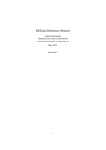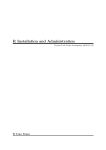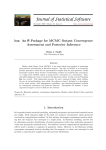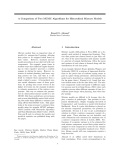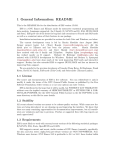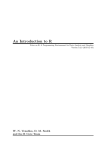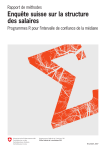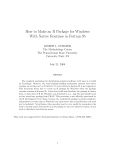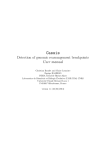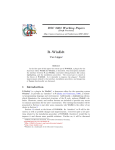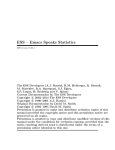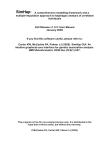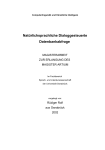Download My first package - IME-USP
Transcript
Motivation Packages Administration Development R-forge, CRAN C, C++, Fortran Functions, Scoping Rules Namespace Debug References
4
What is R?
Dept. of Statistics
Start the help system
in a browser
Help on a function
Open Source
Tools for transfer of technology and methods using packages
Data access mechanism ...
package
7
Help me!
A language and environment for data analysis and graphics
My first
Motivation Packages Administration Development R-forge, CRAN C, C++, Fortran Functions, Scoping Rules Namespace Debug References
Similar functions
search by keyword
...
help.start()
help("functionname")
?functionname
apropos("functionname")
help.search("keyword")
Uwe Ligges
April 2011, Bordeaux, France
Uwe Ligges: My first R package
Motivation Packages Administration Development R-forge, CRAN C, C++, Fortran Functions, Scoping Rules Namespace Debug References
2
Contents
April 2011, Bordeaux, France
Motivation Packages Administration Development R-forge, CRAN C, C++, Fortran Functions, Scoping Rules Namespace Debug References
5
Where can I get R from?
Installation and administration of R packages in libraries
Make the build tools work under Unix, Mac OS, and Windows
April 2011, Bordeaux, France
Motivation Packages Administration Development R-forge, CRAN C, C++, Fortran Functions, Scoping Rules Namespace Debug References
In the R command line it is easy to quickly calculate things, but writing
functions is not very convenient.
Hence it is recommended to choose an appropriate editor.
Using R CMD build, INSTALL, check
R sources and binaries for some operating systems
Development of R packages
Almost 3000 R packages for various (statistical) methods
A function can be saved in some kind of a text file on the hard disc
and reloaded with source("filename").
...
Tiny functions and code pieces can be submitted via Copy&Paste.
Data
Functions
Documentation format and processing
C Code
Scoping issues
Namespaces
Debugging
8
Editors for R
R has some homepage http://www.R-Project.org and there is the
CRAN (Comprehensive R Archive Network):
http://CRAN.R-Project.org:
Introduction and the usefulness of R packages
Uwe Ligges: My first R package
Syntax highlighting, auto-completion and other features are
desirable.
Let me start with some excerpts of a beginners R course.
Uwe Ligges: My first R package
April 2011, Bordeaux, France
Motivation Packages Administration Development R-forge, CRAN C, C++, Fortran Functions, Scoping Rules Namespace Debug References
3
Benefits and drawbacks of R
Uwe Ligges: My first R package
April 2011, Bordeaux, France
Motivation Packages Administration Development R-forge, CRAN C, C++, Fortran Functions, Scoping Rules Namespace Debug References
6
Functions
Benefits
9
ESS (Emacs Speaks Statistics,
http://cran.r-project.org/other-software.html) for the
well known Emacs or XEmacs editor. With ESS it is possible to use
(X)Emacs to control statistics software such as R and others
conveniently.
Defaults are documented on the help pages.
...
Not a ‘black box’
Within current research
Extendability
...
April 2011, Bordeaux, France
Motivation Packages Administration Development R-forge, CRAN C, C++, Fortran Functions, Scoping Rules Namespace Debug References
Editors for R
All work is applied using functions.
Open Source
Uwe Ligges: My first R package
Everything is an object (both data and functions)!
For Windows, the free editor Tinn-R
(https://sourceforge.net/projects/tinn-r) is available
Support
as well as the R–WinEdt interface for the commercial editor WinEdt
(not ready for WinEdt 6.x)
...
Drawbacks
...
Uwe Ligges: My first R package
April 2011, Bordeaux, France
Uwe Ligges: My first R package
April 2011, Bordeaux, France
Uwe Ligges: My first R package
April 2011, Bordeaux, France
Motivation Packages Administration Development R-forge, CRAN C, C++, Fortran Functions, Scoping Rules Namespace Debug References
10
Packages
Motivation Packages Administration Development R-forge, CRAN C, C++, Fortran Functions, Scoping Rules Namespace Debug References
13
Packages by V&R
Package: structured, standardized unit of R code, documentation,
data, external code, ...
class
MASS
nnet
Packages are loaded by library("Packagename") and unloaded
by detach().
Help on packages (instead of functions) can be accessed by
library(help = "Packagename").
spatial
Motivation Packages Administration Development R-forge, CRAN C, C++, Fortran Functions, Scoping Rules Namespace Debug References
16
The S-PLUS (8) package system and CSAN
Classification
Collection of functions by Venables and Ripley (2002)
Neural nets (feed-forward) with one hidden layer
— and multinomial log-linear models
Spatial statistics
Proposed S-PLUS® Packages
An S-PLUS® package is a collection of S-PLUS®
functions, data, help files and other associated source
files that have been combined into a single entity for
distribution to other S-PLUS® users.
This package system is modeled after the package
system in R.
Insightful Corporation hosts the Comprehensive
S-PLUS® Archival Network (CSAN) site at
http://csan.insightful.com/ to facilitate S-PLUS®
package distribution.
Packages can be downloaded from the CSAN websites
in two forms: as raw source code or as Windows
binaries.
On CRAN there are more almost 3000 packages available - on all
(un)thinkable topics you can(not) imagine.
The Omega(hat) and BioConductor projects are maintaining their
own package repositories.
An R standard installation loads the packages base, datasets,
graphics, grDevices, methods, stats and utils on startup.
Several package (including base) are shipped with R,
as well as several important recommended packages.
Uwe Ligges: My first R package
11
additional ‘standard packages’
Uwe Ligges: My first R package
April 2011, Bordeaux, France
Motivation Packages Administration Development R-forge, CRAN C, C++, Fortran Functions, Scoping Rules Namespace Debug References
14
Extensions
R base package
Collection of datasets
Graphics functions
Graphics devices
Re-design for graphics layout (e.g. for lattice)
S 4 methods (Chambers, 1998)
Splines
Common statistical functions (tests, ...)
Same as stats with S 4 classes
GUI programming with tcl/tk
Tools for package development, administration, documentation
Some helper functions
Uwe Ligges: My first R package
generate standardized documentation for these functions,
integrate C, C++, or Fortran code in form of a shared library (DLL),
create packages that include the before mentioned things and that
can easily be installed and distributed.
If you have written some useful code that implements some interesting
method, you might want to publish it on CRAN in form of a package like many others did already.
12
additional ‘recommended packages’
Uwe Ligges: My first R package
April 2011, Bordeaux, France
Motivation Packages Administration Development R-forge, CRAN C, C++, Fortran Functions, Scoping Rules Namespace Debug References
15
Why Packages?
Uwe Ligges: My first R package
Bootstrap methods (Davison and Hinkley, ’97)
Cluster methods (Rousseeuw et al.)
Code analysis
Import and export from and to Minitab, S, SAS, SPSS, Stata, ...
Kernel density estimation and smoothing (Wand & Jones, ’95)
Trellis graphics (Cleveland, ’93)
Matrix classes (e.g. for sparse matrices)
Generalized additive models
(Non-) linear models with mixed effects (Pinheiro & Bates, ’00)
Recursive partitioning
Survival analysis (hazard, Cox, censoring)
April 2011, Bordeaux, France
17
Uwe Ligges: My first R package
April 2011, Bordeaux, France
Motivation Packages Administration Development R-forge, CRAN C, C++, Fortran Functions, Scoping Rules Namespace Debug References
18
Load packages from libraries
Examples:
Why should we package anything?
boot
cluster
codetools
foreign
KernSmooth
lattice
Matrix
mgcv
nlme
rpart
survival
April 2011, Bordeaux, France
Motivation Packages Administration Development R-forge, CRAN C, C++, Fortran Functions, Scoping Rules Namespace Debug References
Installed R packages live in a library, i.e. some directory
and can be loaded from that library by
library("Packagename", lib.loc = Path_to_library)
.libPaths() shows which libraries are looked up for packages
automatically
A library can be added by .libPaths() to the search path
or the library can be set before the start of R in the environment
variable R_LIBS, e.g. in file .Renviron:
R_LIBS=/home/user/myR/myLibrary;/home/user/myR/develLibrary
Both base and recommended packages are in the main library in
directory R_HOME/library
R_HOME is the path that points to the current version of R , e.g.
/usr/local/lib/R or c:\Program Files\R-x.y.z.
Default is to install new packages into the first place of the result of
.libPaths().
write your own functions,
April 2011, Bordeaux, France
Motivation Packages Administration Development R-forge, CRAN C, C++, Fortran Functions, Scoping Rules Namespace Debug References
Insightful Corporation, All Rights Reserved.
Uwe Ligges: My first R package
Load packages from libraries
R is extremely extensible by the user. It is possible to
base
datasets
graphics
grDevices
grid
methods
splines
stats
stats4
tcltk
tools
utils
Copyright © 1999 – 2006
8
April 2011, Bordeaux, France
Motivation Packages Administration Development R-forge, CRAN C, C++, Fortran Functions, Scoping Rules Namespace Debug References
Dynamical loading of packages (saves memory).
Easy installation and update of packages (locally or from the web),
within R or from the OS’s command line.
Easy administration – use global (department’s server) and local
libraries at the same time.
library(help = "survival")
library("survival")
detach("package:survival")
.libPaths("c:/temp")
.libPaths()
#
#
#
#
help
load
unload
set library
Validation – R includes features for checking code, documentation
and installability, as well as testing the results of pre-defined
calculations.
easy distribution to others using a standard mechanism.
Example data.
Uwe Ligges: My first R package
April 2011, Bordeaux, France
Uwe Ligges: My first R package
April 2011, Bordeaux, France
Motivation Packages Administration Development R-forge, CRAN C, C++, Fortran Functions, Scoping Rules Namespace Debug References
19
Libraries
Motivation Packages Administration Development R-forge, CRAN C, C++, Fortran Functions, Scoping Rules Namespace Debug References
22
Package administration
Structuring packages
Developer and user library
central installation (no write permission for users) vs. local library of
own packages
Examples:
central library of standard packages, e.g.
n:\software\R-x.y.z\library,
contrib.url()
packageStatus()
central library of CRAN packages, e.g. n:\software\Rlibs\CRAN,
25
Package administration – binary packages
Summary of R functions:
available.packages()
packages in selected repositories
download.packages() download packages
install.packages()
install packages
installed.packages()
locally installed package
new.packages()
package in repository that are not installed locally
locally installed package with newer versions in the
old.packages()
repository
update.packages()
update package
More than one library makes sense:
Motivation Packages Administration Development R-forge, CRAN C, C++, Fortran Functions, Scoping Rules Namespace Debug References
Some tools are missing on typical Windows systems
Windows shell (command line) differs from typical Unix systems
For CRAN like repositories, R looks for packages in, e.g.
CRAN-mirror/bin/windows/contrib/2.12/.
ReadMe contains information what happened to packages not
passing R CMD check .
GUI available for R under Windows: Packages“ provides the
”
interface for install.packages() etc.
(all installations into .libPaths()[1] !).
generates canonical form of repository
considered to be the future (since several years)?!
central library of BioC packages, e.g. n:\software\Rlibs\BioC,
local user library, e.g. d:\something\myRlibs\work,
local developer library, e.g. d:\something\myRlibs\devel.
Uwe Ligges: My first R package
April 2011, Bordeaux, France
Motivation Packages Administration Development R-forge, CRAN C, C++, Fortran Functions, Scoping Rules Namespace Debug References
20
Package administration
Uwe Ligges: My first R package
April 2011, Bordeaux, France
Motivation Packages Administration Development R-forge, CRAN C, C++, Fortran Functions, Scoping Rules Namespace Debug References
23
Package administration – binary packages
Documentation:
‘The R FAQ’ and ‘R for Windows FAQ’
‘R Help Desk: Package Management’ in R News 3(3)
"win.binary"
> install.packages(
+
"c:/somewhere/MyPackage_0.0-1.zip",
+
lib = "c:/somewhere/myLibrary", CRAN = NULL)
"mac.binary.leopard"
"mac.binary"
CRAN (+ CRAN extras for Windows), BioConductor, Omega
26
Example:
Install the binary package MyPackage from the local file
c:\somewhere\MyPackage_0.0-1.zip into c:\myR\myLibrary:
The argument type in install.packages(), update.packages()
and friends can be set to
Repositories:
April 2011, Bordeaux, France
Motivation Packages Administration Development R-forge, CRAN C, C++, Fortran Functions, Scoping Rules Namespace Debug References
Package administration – local binary packages
Manual ‘R Installation and Administration’
"source"
Uwe Ligges: My first R package
The default is the appropriate binary type on Windows and on the CRAN
binary Mac OS X distribution, otherwise it is "source". These can be
overridden to install from sources under Windows, for example.
setRepositories() or options("repos" = ...)
for selecting repositories
chooseCRANmirror() and chooseBioCmirror()
for choosing mirror servers
Uwe Ligges: My first R package
April 2011, Bordeaux, France
Motivation Packages Administration Development R-forge, CRAN C, C++, Fortran Functions, Scoping Rules Namespace Debug References
21
Package administration
Uwe Ligges: My first R package
April 2011, Bordeaux, France
Motivation Packages Administration Development R-forge, CRAN C, C++, Fortran Functions, Scoping Rules Namespace Debug References
24
32- vs. 64-bit Windows binaries
install.packages("package", lib = "/Path/to/library")
automatically downloads the most recent version of a package from
the repositories and installs it,
no need to specify lib, if the first place of the search path is the
right library,
the argument dependencies = TRUE implies to install all declared
dependent and suggested packages of the package.
Uwe Ligges: My first R package
April 2011, Bordeaux, France
Motivation Packages Administration Development R-forge, CRAN C, C++, Fortran Functions, Scoping Rules Namespace Debug References
27
CRAN Task Views
Since R-2.12.0:
CRAN contains almost 3000 packages: Confusing!!!
CRAN Task Views: Provide some summary and structure by topics
use gcc 4.5.0 for 32-bit and gcc 4.5.2 for 64-bit R
grouping of packages (also by priority)
bi-arch binaries for both R and packages.
administration package: ctv (Zeileis and Hornik, 2006)
which structure is available: available.views()
install all packages of one group: install.views()
update.packages()
Examples:
installs new versions of packages from the repositories
argument checkBuilt = TRUE implies recompiling of packages
after a major upgrade of R .
Uwe Ligges: My first R package
April 2011, Bordeaux, France
library("ctv")
(temp <- available.views())
temp[[8]]
install.views("MachineLearning", coreOnly = TRUE)
Uwe Ligges: My first R package
April 2011, Bordeaux, France
Uwe Ligges: My first R package
April 2011, Bordeaux, France
Motivation Packages Administration Development R-forge, CRAN C, C++, Fortran Functions, Scoping Rules Namespace Debug References
28
Source vs. binary packages
Motivation Packages Administration Development R-forge, CRAN C, C++, Fortran Functions, Scoping Rules Namespace Debug References
Source packages are independent of the platform (hardware,
operating system).
collection of cygwin based shell tools
MinGW gcc (4.5.x) distribution
libraries for bitmap/jpeg support
vanilla perl
libraries for tcl/tk support
LATEX (e.g. MiKTeX): http://www.miktex.org/
April 2011, Bordeaux, France
Motivation Packages Administration Development R-forge, CRAN C, C++, Fortran Functions, Scoping Rules Namespace Debug References
> package.skeleton(name = "MyPackage", ListOfObjects, path=".")
Creating directories ...
Creating DESCRIPTION ...
Creating READMEs ...
Saving functions and data ...
Making help files ...
Done.
Further steps are described in ./MyPackage/README
R tools: http://www.murdoch-sutherland.com/Rtools
Binary packages can be installed without prerequisites: ‘shared object
files’ and DLL, help pages, meta information are already precompiled
in a binary package.
CRAN provides binary packages for recent R versions for some
platforms, e.g. Windows and MacOS X (PowerPC + Intel).
Binary packages for Windows are provided roughly two days after the
source packages appear.
34
Examples:
See: R Development Core Team (2011a), Ligges and Murdoch
(2005)
Binary packages are platform-specific and may depend on the R
version in use.
Motivation Packages Administration Development R-forge, CRAN C, C++, Fortran Functions, Scoping Rules Namespace Debug References
Package generation
Configure your environment:
Prerequisites for installing source packages: Perl, C(++) compiler,
Fortran compiler, . . . .
CRAN accepts only source packages
Standard way of distributing packages for Unix-like systems (Linux,
Solaris, . . . ).
Uwe Ligges: My first R package
31
Source packages under Windows
29
Source vs. binary packages
Uwe Ligges: My first R package
April 2011, Bordeaux, France
Motivation Packages Administration Development R-forge, CRAN C, C++, Fortran Functions, Scoping Rules Namespace Debug References
32
Source packages under Windows
Distinction between binary and source packages by line starting with
Built: in file DESCRIPTION:
Built: R 2.12.2; i386-pc-mingw32; 2011-04-11 09:30:00 UTC; windows
File extensions (by agreement):
.tar.gz: Source package
.zip: binary package for Windows
.tgz: binary package for Mac,
.deb or .rpm: binary package for Linux
Uwe Ligges: My first R package
April 2011, Bordeaux, France
Motivation Packages Administration Development R-forge, CRAN C, C++, Fortran Functions, Scoping Rules Namespace Debug References
35
Package generation
Set paths (in environment variable ‘PATH’) to local (.) and all
...\bin paths (should happen automatically, if selected).
PATH=.;c:\devel\tools\bin;c:\devel\MinGW\bin;
c:\devel\R-2.12.2\bin;c:\devel\Perl\bin;
c:\devel\texmf\miktex\bin;%PATH%
package.skeleton():
generates a skeleton for package MyPackage
with files from ListOfObjects
in the given path (here the current working directory)
generates first version of the file DESCRIPTION
generates first versions for the documentation file in *.Rd format –
you just need to them fill out
tells us what to do next
Set environment variable ‘TMPDIR’ (otherwise ‘TEMP’ is used)
Next steps are:
If all files have been edited, you can build the package by
R CMD build.
R CMD INSTALL installs the package.
R CMD check checks for consistency, installability, documentation ...
Uwe Ligges: My first R package
April 2011, Bordeaux, France
Motivation Packages Administration Development R-forge, CRAN C, C++, Fortran Functions, Scoping Rules Namespace Debug References
30
Package administration II
Uwe Ligges: My first R package
April 2011, Bordeaux, France
Motivation Packages Administration Development R-forge, CRAN C, C++, Fortran Functions, Scoping Rules Namespace Debug References
33
Structure of packages
For locally available source package, it is more common to use the OS’s
command line:
$ R CMD INSTALL -l /Path/to/library Paket
If -l /Path/to/library is not given (to specify the library explicitly):
first library from environment variable R_LIBS is used
main library is used
.Renviron is not evaluated by R CMD .....
Uwe Ligges: My first R package
April 2011, Bordeaux, France
Motivation Packages Administration Development R-forge, CRAN C, C++, Fortran Functions, Scoping Rules Namespace Debug References
36
Packages: Data and functions
A package consists of some standard files and directories, the latter
containing certain files as described in the manual Writing R Extensions:
DESCRIPTION (file) with standardized formatted entries for author,
license, title, dependencies, ...
NAMESPACE (file) for generating a Namespace
man/ (directory) contains documentation in *.Rd format.
R/ (directory) contains R code.
data/ (directory) contains data sets.
src/ (directory) contains C, C++, or Fortran sources.
tests/ (directory) contains files for validation.
demo/ (directory) contains R Code for demo purposes
inst/ (directory) contains stuff that is to be copied in the main
directory of a binary package (e.g. Vignettes).
Each data set and each function lives in a separate file
regularly named by object name
function close to each other (such as generics with methods) are
sometimes contained in one file
regularly with corresponding documentation in /man
Data can be loaded with data() and has to be put into the
data/ directory in one of the formats:
‘rectangular’ text file: separated by blank or comma, extension .csv,
.tab or .txt
R source code written by dump() (extension .r or .R), and
R binary file written by save() (extension .rda or .RData).
Code that should be executed once the package is loaded should go
into the file R/zzz.R.
Except for the DESCRIPTION file all other items above are optional.
Uwe Ligges: My first R package
April 2011, Bordeaux, France
Uwe Ligges: My first R package
April 2011, Bordeaux, France
Uwe Ligges: My first R package
April 2011, Bordeaux, France
Motivation Packages Administration Development R-forge, CRAN C, C++, Fortran Functions, Scoping Rules Namespace Debug References
37
Packages: Documentation
Motivation Packages Administration Development R-forge, CRAN C, C++, Fortran Functions, Scoping Rules Namespace Debug References
40
Packages: Documentation
Manuals and reports: Package Vignettes with SWeave
Package, if all files have been generated:
R CMD build builds the package and generates the vignettes
documentation is available for all (exported) data sets and functions
in a package
Help pages:
Install: R CMD INSTALL
Check: R CMD check
the \usage part corresponds to the actual definition of the function
package.skeleton() prepares all Rd files for a package
the code in section \examples can be executed without any error
prompt() prepares a separate Rd file for one object to be
documented
all the arguments of a function are documented
Uwe Ligges: My first R package
Consistency, installability
Documentation (as mentioned before)
Test cases (.R files) in directory tests/.
Results (.Rout files) are compared with ‘true’ results (given as
.Rout.save files)
all the defaults are documented
LATEX like syntax
.Rd files can be converted to the different formats
April 2011, Bordeaux, France
Motivation Packages Administration Development R-forge, CRAN C, C++, Fortran Functions, Scoping Rules Namespace Debug References
38
Packages: Documentation
Uwe Ligges: My first R package
April 2011, Bordeaux, France
Motivation Packages Administration Development R-forge, CRAN C, C++, Fortran Functions, Scoping Rules Namespace Debug References
41
Vignettes
Example for an *.Rd file:
Uwe Ligges: My first R package
R-forge (http://r-forge.r-project.org/) is a cental developer
platform for R packages offering easy access to the best in
Vignettes
Name of help page (commonly = \alias)
Name(s) of function(s) that are described
are in the installed package in form of PDF files
\title
title
SVN
short description
are in the source package in directory ./inst/doc
\description
\usage
function call including all arguments and their defaults
are shown with
daily built and checked packages
mailing lists, message boards/forums
vignette(package = "grid")
vignette("viewports", package = "grid")
description of all arguments and their meaning
\value
description of the returned value(s)
\details
more detailed description
\references
references (methods, implementation, algorithms)
\seealso
links to other relevant documentation of other functions
\examples
examples how to use the function
\keyword
standardized keyword
44
R-forge
\alias
\arguments
April 2011, Bordeaux, France
Motivation Packages Administration Development R-forge, CRAN C, C++, Fortran Functions, Scoping Rules Namespace Debug References
\name
Uwe Ligges: My first R package
43
Package, install and check a package
The R packaging system checks (using R CMD check) if:
Help pages written in Rd format
Motivation Packages Administration Development R-forge, CRAN C, C++, Fortran Functions, Scoping Rules Namespace Debug References
bug tracking
site hosting
permanent file archival, full backups
total web-based administration.
April 2011, Bordeaux, France
Motivation Packages Administration Development R-forge, CRAN C, C++, Fortran Functions, Scoping Rules Namespace Debug References
39
Packages: Documentation
Uwe Ligges: My first R package
April 2011, Bordeaux, France
Motivation Packages Administration Development R-forge, CRAN C, C++, Fortran Functions, Scoping Rules Namespace Debug References
42
SWeave
allow for mathematical formulas, URLs, links to other help pages,
computation in and on help pages, etc.
Layouted documentation from *.Rd files can be generated directly
by
R CMD Rdconv for conversion to LATEX, HTML and formatted ASCII
text,
R CMD Rd2dvi for conversion to DVI and Adobe PDF.
April 2011, Bordeaux, France
Motivation Packages Administration Development R-forge, CRAN C, C++, Fortran Functions, Scoping Rules Namespace Debug References
45
Submitting to CRAN
Generating vignettes using SWeave (Leisch, 2002):
standardized defaults as well as self defined sections
Uwe Ligges: My first R package
Be sure your package passes the checks without any WARNINGs or
ERRORs (in R-devel!).
Code + Text:
Upload the source (!) package to
ftp://cran.r-project.org/incoming.
Text ...
<<Options>>=
Code chunk
@
... more text.
Sweave helps to integrate code and text automatically:
Send e-mail message to [email protected].
R evaluates the code and returns the results
LATEX renders the text
reproducible data analysis and research
easily re-generate reports with minor changes in the data
R CMD check checks whether code can be executed and evaluated
there is something called odfWeave ...
Uwe Ligges: My first R package
April 2011, Bordeaux, France
Uwe Ligges: My first R package
April 2011, Bordeaux, France
Uwe Ligges: My first R package
April 2011, Bordeaux, France
Motivation Packages Administration Development R-forge, CRAN C, C++, Fortran Functions, Scoping Rules Namespace Debug References
46
What CRAN does
Motivation Packages Administration Development R-forge, CRAN C, C++, Fortran Functions, Scoping Rules Namespace Debug References
49
CRAN Windows Binaries’ Package Check 2011
Last updated on 2011-04-04 09:50:06 (Monday)
Initial check of the package on Linux
Make source package available in the repository
Make binaries available for various OSs (within less than a week)
Regular checks on different platforms
Check summary pages: http:
//cran.r-project.org/web/checks/check_summary.html
Package specific check summaries: http://cran.r-project.org/
web/checks/check_results_tuneR.html
No
Package
Version
R-2.12.2
...
2953
2954
2955
2956
2957
...
ziccode
zipfR
zoeppritz
zoo
zyp
...
0.2
0.6-5
1.0-2
1.6-4
0.9-1
...
OK
OK
OK
OK
OK
Check time
...
3
7
1
4
2
...
27
63
16
69
18
8.4/8
72.0/8
Sum (in hours), 2x Xeon E5430 Quad:
As a simple example we are trying to add two real valued vectors a and
b by a call through .Call().
File c:\test.c:
#include <Rinternals.h>
SEXP add(SEXP a, SEXP b)
{
int i, n;
n = length(a);
for(i = 0; i < n; i++)
REAL(a)[i] += REAL(b)[i];
return(a);
}
Notifications in case the package is broken (by a change in a
dependency or R itself)
Uwe Ligges: My first R package
April 2011, Bordeaux, France
Motivation Packages Administration Development R-forge, CRAN C, C++, Fortran Functions, Scoping Rules Namespace Debug References
47
Win-builder
April 2011, Bordeaux, France
Motivation Packages Administration Development R-forge, CRAN C, C++, Fortran Functions, Scoping Rules Namespace Debug References
50
C, C++, or Fortran code
Builds Windows binaries and checks for validation of the R base
system.
53
returning the a – still an R object
No new R object has been generated, hence no PROTECT() required
Make use of already existing external efficient libraries
Calling compiled external sources can be done by the interfaces
.C(), .Call(), .Fortran(), and .External().
Daily build of R-devel.
Re-check all packages for R-devel – weekly.
Aim: Make new errors of packages or R itself quickly visible to
developers.
A couple of important macros is defined in the header files
R.h and Rinternals.h.
Sometimes it is also useful to look into Rdefines.h for S4 and
friends.
Public system to build and check your won packages under Windows
if that is not available for you:
http://win-builder.r-project.org/.
April 2011, Bordeaux, France
Motivation Packages Administration Development R-forge, CRAN C, C++, Fortran Functions, Scoping Rules Namespace Debug References
48
Win-builder
Uwe Ligges: My first R package
April 2011, Bordeaux, France
Motivation Packages Administration Development R-forge, CRAN C, C++, Fortran Functions, Scoping Rules Namespace Debug References
51
C, C++, or Fortran code
We need a check system that builds and checks at least within 24
hours for each flavor of R in order to
provide check results when still of interest
provide binaries directly after switching to alpha/beta/rc/release
phase.
Code is compiled automatically during package installation:
R CMD INSTALL compiles code in the package (directory src/)
dyn.load(filename) loads and dyn.unload() unloads the
resulting library
library("packagename") should load it, if in a package
library.dynam() can be used in function .First.lib() in zzz.R
or define it in your Namespace (later on)...
Uwe Ligges: My first R package
April 2011, Bordeaux, France
Motivation Packages Administration Development R-forge, CRAN C, C++, Fortran Functions, Scoping Rules Namespace Debug References
54
Now we can generate a library from the C file test.c using
R CMD SHLIB :
$ R CMD SHLIB test.c
gcc -I"t:/R/include" -O3 -Wall -std=gnu99 -c test.c -o test.o
gcc -shared -s -o test.dll tmp.def test.o -Lt:/R/bin -lR
Some files are generated now, particularly file add.dll (Windows) or
add.so (Unix) respectively.
do never forget the garbage collector!
April 2011, Bordeaux, France
Uwe Ligges: My first R package
Example: C with .Call
R CMD SHLIB compiles the code without installing a whole
package, i.e. you can invoke compiler and linker manually
Uwe Ligges: My first R package
April 2011, Bordeaux, France
Motivation Packages Administration Development R-forge, CRAN C, C++, Fortran Functions, Scoping Rules Namespace Debug References
add, a, b: SEXP (Symbolic EXPression)
Speed
Notification of developers.
Uwe Ligges: My first R package
Example: C with .Call
Why do we want to have compiled code?
Builds and checks new and updated packages – daily, at least for
R-release and R-devel.
Uwe Ligges: My first R package
Uwe Ligges: My first R package
52
Example: C with .Call
(simplified)
Inst. time
Motivation Packages Administration Development R-forge, CRAN C, C++, Fortran Functions, Scoping Rules Namespace Debug References
April 2011, Bordeaux, France
Uwe Ligges: My first R package
April 2011, Bordeaux, France
Motivation Packages Administration Development R-forge, CRAN C, C++, Fortran Functions, Scoping Rules Namespace Debug References
55
Example: C with .Call
Motivation Packages Administration Development R-forge, CRAN C, C++, Fortran Functions, Scoping Rules Namespace Debug References
R code:
A typical function definition might look like the following:
dyn.load("c:/test.dll")
# load the library
# or library("Packagename"), if in some package ...
median <- function(x, na.rm = FALSE){
# ... many lines of code! ...
sort(x, partial = half)[half]
}
# Definition of the calling R function:
add <- function(a, b){
if(!is.numeric(a) || !is.numeric(b))
stop("a and b must be numeric")
if(length(a) != length(b))
stop("a and b must have same length")
.Call("add", as.double(a), as.double(b))
}
Motivation Packages Administration Development R-forge, CRAN C, C++, Fortran Functions, Scoping Rules Namespace Debug References
56
Functions
Uwe Ligges: My first R package
Examples:
lazy <- function(x, calc = TRUE) {
if(calc) x <- x+1
print(a)
}
lazy((a <- 3), calc = FALSE)
lazy(a <- 3)
label <- function(x)
return(list(call = substitute(x), value = x))
label(1+2)
April 2011, Bordeaux, France
Motivation Packages Administration Development R-forge, CRAN C, C++, Fortran Functions, Scoping Rules Namespace Debug References
59
Functions
All work in R is done by functions.
In (more complex) functions many objects are generated that are only of
temporary use. Hence it makes sense to evaluate functions in separate
environments, in order not to clutter the workspace with unneeded
objects. Therefore things are more transparent and less RAM is
consumed.
Next, all unnamed arguments are assigned in the given order to the
remaining formal arguments.
An argument without default must be specified in a function call.
An argument with default may be specified in a function call (and
the default may be changed).
All remaining arguments are assigned to the three dots argument:
...
This means assignments within a function will not be saved in the
workspace. And objects from the workspace should be passed as
arguments to functions that require those objects.
You can test if a formal argument is missing in a call by missing().
Uwe Ligges: My first R package
April 2011, Bordeaux, France
Motivation Packages Administration Development R-forge, CRAN C, C++, Fortran Functions, Scoping Rules Namespace Debug References
57
Functions
April 2011, Bordeaux, France
Motivation Packages Administration Development R-forge, CRAN C, C++, Fortran Functions, Scoping Rules Namespace Debug References
60
Functions
Write your own functions in order to collect a sequence of other function
calls to do the same thing more than once, maybe with some parameters
changed.
A function definition looks like this:
MyFunction <- function(arguments){ statements },
where the arguments can be defined with or without defaults. When
the function is called, the arguments are passed to the statements.
Statements may consist of several lines, as far as they are enclosed in
braces (same is true for loops, for example).
Uwe Ligges: My first R package
Uwe Ligges: My first R package
April 2011, Bordeaux, France
Uwe Ligges: My first R package
April 2011, Bordeaux, France
Motivation Packages Administration Development R-forge, CRAN C, C++, Fortran Functions, Scoping Rules Namespace Debug References
63
Scoping rules
It is possible to use the formal ‘three dots argument’ ... in the definition
of a function. All non-matching actual arguments (in the sense of not
matching to any other argument) are collected by .... This can be
handled within the function or (what is more common) passed to other
functions via ....
Some more detailed comments related to Scoping Rules follow:
R keeps all environments in its main memory (RAM)
All top level generated R objects go into the workspace
(‘.GlobalEnv’), number 0.
There is some search path of environments containing packages (for
functions) and data bases (for data.fram,es). At the center there is
the ‘.GlobalEnv’ (workspace), at the end the base package and in
between some objects added to the path by calls to library() or
attach().
Examples:
ThreePoints <- function(x, ...){
x <- x - 2
median(x, ...)
}
x <- log(-1:100)
ThreePoints(x)
ThreePoints(x, na.rm = TRUE)
Uwe Ligges: My first R package
62
If you work in the R console directly, all new objects are created within
the workspace.
Then, arguments with partially given names are matched to the
remaining formal arguments (na = TRUE).
There are arguments with defaults:
April 2011, Bordeaux, France
Motivation Packages Administration Development R-forge, CRAN C, C++, Fortran Functions, Scoping Rules Namespace Debug References
During programming, the question arises: ‘When are what objects visible
for which functions?’
At first, all arguments with completely given names are matched
(x = 1:10).
There are some special functions with convenient abbreviations such
as +.
You can rewrite 3 + 5 to its real function call: "+"(3, 5).
The name is not a regular one, hence the quotes.
An assignment has the full form: "<-"(x, 3).
Uwe Ligges: My first R package
Scoping rules
So we have to distinguish between formal arguments in a function’s
definition and actual arguments as specified in the function call. The rules
to match actual and formal arguments are applied in the following way:
A function call has the form
functionname(argument1 = arg1, argument2 = arg2, etc.),
where the arguments can be specified by name or not.
61
R uses lazy evaluation of functions’ arguments, i.e. statements used as
actual arguments will be evaluated in their first usage, but not before:
median(a)
(na.rm may be omitted, the default)
median(a, TRUE) (arguments ordered correctly, no names required)
median(na.rm = TRUE, x = a) (named arguments)
April 2011, Bordeaux, France
Motivation Packages Administration Development R-forge, CRAN C, C++, Fortran Functions, Scoping Rules Namespace Debug References
Lazy evaluation
There are two arguments: x, na.rm.
Only the second argument has a default: FALSE.
The last line of the function defines its value. More than one object
can be returned as a list of objects. If return() is called, function
evaluation stops and the argument of return() is returned.
For a vector a, the following calls may be sensible:
add(4:3, 8:9)
Uwe Ligges: My first R package
58
Functions
If a function is called, a new environment (starting with number 1)
is created.
If a function is called within the former function, the next
environment is generated.
April 2011, Bordeaux, France
Uwe Ligges: My first R package
April 2011, Bordeaux, France
Motivation Packages Administration Development R-forge, CRAN C, C++, Fortran Functions, Scoping Rules Namespace Debug References
64
Scoping rules
Motivation Packages Administration Development R-forge, CRAN C, C++, Fortran Functions, Scoping Rules Namespace Debug References
67
Scoping rules
Consider you define
foo <- function(x) sin(2 * pi * x)
This means a function that has been created in some specific
environment and assigned to some object outside of the function
afterwards, always knows all object of the originating environment.
Therefore, under such circumstances, an environment is not deleted (but
only if no function has been returned).
If a function returns, its environment is deleted (incl. all the objects
it contains). Therefore you have to return() objects for further
use.
The functions assign() and get() can assign objects to or
get objects from arbitrary environments.
then you probably expect that the objects sin() and pi are from
package base. If there are functions with the same names in other
packages or the workspace, the latter objects would be found before
those in base:
This feature might be beneficial but also confusing (because scoping
rules are different). In the latter case also consult Venables, W.N. and
Ripley, B.D. (2000).
foo <- function(x)
sin(2 * pi * x)
foo(1:5)
# Expected: [1] -2.449213e-16 -4.898425e-16
sin <- sum
pi <- 0.5
foo(1:5)
# Sum of (1:5) = 15
There are some more exceptions from the described scoping rules, most
important one is implemented by namespace rules which will be described
later.
Uwe Ligges: My first R package
April 2011, Bordeaux, France
Motivation Packages Administration Development R-forge, CRAN C, C++, Fortran Functions, Scoping Rules Namespace Debug References
65
Scoping rules
-8 package:base
-7 Autoloads
... ... ... ... ...
-2 package:methods
-1 package:stats
0 .GlobalEnv
1 environment 1
2 environment 2
3 environment 3
Workspace
Function 1
Function 2
Function 3
Type search() for the current search path.
Uwe Ligges: My first R package
April 2011, Bordeaux, France
66
Scoping rules
68
A namespace guarantees that no objects from base are masked for
functions in other namespaces.
l.scope <- function()
{
only.here <- 2
newFoo <- function()
print(only.here)
return(newFoo)
}
value <- l.scope()
You can explicitly import objects from other namespaces. These
cannot be accidently overloaded afterwards. Packages loaded by
import directives are not attached to the search path.
# --> S-Plus: ERROR
# --> R: 3
# --> S-Plus: 5
# --> S-Plus: ERROR
# --> S-Plus: 4
Uwe Ligges: My first R package
April 2011, Bordeaux, France
Motivation Packages Administration Development R-forge, CRAN C, C++, Fortran Functions, Scoping Rules Namespace Debug References
69
Uwe Ligges: My first R package
April 2011, Bordeaux, France
Motivation Packages Administration Development R-forge, CRAN C, C++, Fortran Functions, Scoping Rules Namespace Debug References
For explicit access to an object in a package with namespace the
‘::’ operator can be used, which separates the name of the
namespace and the object’s name. Hence, stats::ks.test
accesses the object (function) ks.test in namespace stats.
The number of contributed packages increases almost daily, hence
you can expect name clashes of function between all those packages.
In rare cases, you want to access non exported functions which can
happen by calling getFromNamespace().
Namespaces define which objects are visible to the user and to other
functions, and which are only visible within the own namespace.
The operator ‘:::’ can access a non exported object as well.
Uwe Ligges: My first R package
72
Namespaces
A namespace’s objects are independent of names of other
namespaces’ functions.
April 2011, Bordeaux, France
71
A function from some namespace looks for objects according to the
following rules: at first it looks into the own namespace, then into
imported objects or namespaces, then into the base namespaces,
and then the already known scoping rules are applied.
Functions that are not exported, are only visible within the own
namespace (and hidden to the user).
# --> R: 3
April 2011, Bordeaux, France
Motivation Packages Administration Development R-forge, CRAN C, C++, Fortran Functions, Scoping Rules Namespace Debug References
Examples:
Some more rules (in addition to the known scoping rules, how to search
objects in existing environments) have been introduced by R’s
Namespaces support.
scope <- function()
{
x <- 3
inner <- function()
print(x)
inner()
}
Uwe Ligges: My first R package
Namespaces
Namespaces
Examples:
Uwe Ligges: My first R package
April 2011, Bordeaux, France
Motivation Packages Administration Development R-forge, CRAN C, C++, Fortran Functions, Scoping Rules Namespace Debug References
value()
# --> R: 2
only.here <- 4
value()
# --> R: 2
Motivation Packages Administration Development R-forge, CRAN C, C++, Fortran Functions, Scoping Rules Namespace Debug References
scope()
x <- 5
scope()
Uwe Ligges: My first R package
Scoping rules
#
#
#
#
70
Namespaces
R is capable of so called Lexical Scoping (Gentleman, R. and Ihaka, R.,
2000).
Search rule is that a function looks for objects (a) in its own
environment, (b) the one of its parents, (c) the workspace and (d)
all the attached packages and data bases.
Motivation Packages Administration Development R-forge, CRAN C, C++, Fortran Functions, Scoping Rules Namespace Debug References
fixInNamespace(): change / replace a function within a
namespace.
getS3method(): access a non-exported method.
getAnywhere(): all objects in the search path and loaded
namespaces are looked up.
April 2011, Bordeaux, France
Uwe Ligges: My first R package
April 2011, Bordeaux, France
Motivation Packages Administration Development R-forge, CRAN C, C++, Fortran Functions, Scoping Rules Namespace Debug References
73
Namespaces
Motivation Packages Administration Development R-forge, CRAN C, C++, Fortran Functions, Scoping Rules Namespace Debug References
76
Debugging
Examples:
If you write your own functions, you will make mistakes!
#
#
#
#
#
load MASS
function lda: generic
Which methods?
lda.default is not exported
look at it anyway ...
Online at http://CRAN.R-Project.org/manuals.html and in R:
R Development Core Team (2011a): R Installation and
Administration. ISBN 3-900051-09-7.
In more complicated functions it may be worse to find a bug, leading
to nervous breakdowns.
R offers some tools for easy debugging.
R Development Core Team (2011b): R Language Definition.
ISBN 3-900051-13-5.
It is advisable to debug your own package with deactivated
Namespace (i.e. just rename the NAMESPACE file and reinstall),
otherwise see ?debugInNamespace.
R Development Core Team (2011c): R: A Language and
Environment for Statistical Computing. ISBN 3-900051-07-0.
R Development Core Team (2011d): Writing R Extensions.
ISBN 3-900051-11-9.
Beside those tools, you can print (print(), cat()) objects or
informative texts to the console, of course.
Uwe Ligges: My first R package
April 2011, Bordeaux, France
Motivation Packages Administration Development R-forge, CRAN C, C++, Fortran Functions, Scoping Rules Namespace Debug References
74
the file NAMESPACE
Uwe Ligges: My first R package
The R Journal (formerly R News): http://journal.r-project.org/.
April 2011, Bordeaux, France
Motivation Packages Administration Development R-forge, CRAN C, C++, Fortran Functions, Scoping Rules Namespace Debug References
77
Debugging with tools
The file NAMESPACE in the toplevel directory of your package:
Ihaka, R. and Gentleman, R. (1996): R: A language for data analysis
and graphics. Journal of Computational and Graphical Statistics 5,
299–314.
recover() and options(error = recover): If an error
emerges, the browser is started so that you can jump into one of the
environments that existed at the time where the error occured.
import() imports a whole namespace, importFrom() imports
objects from another namespace
S4 objects:
Leisch, F. (2002): Sweave User Manual.
http://www.ci.tuwien.ac.at/~leisch/Sweave
Ligges, U. (2003): R Help Desk: Package Management. R News
3(3), 37–39.
Ligges, U. and Murdoch, D. (2005): R Help Desk: Make ‘R CMD’
Work under Windows - an Example. R News 5(2), 27–28.
exportClasses(), exportMethods()
importClassesFrom(), importMethodsFrom()
Uwe Ligges: My first R package
80
Gentleman, R. and Ihaka, R. (2000): Lexical Scope and Statistical
Computing. Journal of Computational and Graphical Statistics 9,
491–508.
browser() starts the browser at this place within a function.
define S3 methods:
S3method()
April 2011, Bordeaux, France
Motivation Packages Administration Development R-forge, CRAN C, C++, Fortran Functions, Scoping Rules Namespace Debug References
Chambers, J.M. (2008): Software for Data Analysis: Programming
with R, Springer, New York.
debug(foo) enables debugging for the function foo, i.e. it will be
executed within some browser (see below; until debugging is turned
off again with undebug(foo)).
define code to be loaded (in form of an external library such as a
DLL):
useDynLib()
Uwe Ligges: My first R package
References — R I
traceback() shows which function has caused the last error,
including the stack (‘path’) of calls. This way you can find the bad
function even within very encapsulated function calls.
define objects to be imported and exported:
export() and exportPattern() (for exporting many objects at a
time)
79
References — Core manuals
If it is a small function, it may be easy to find the error.
library("MASS")
lda
methods(lda)
lda.default
getS3method("lda", "default")
getAnywhere("lda.default")
MASS:::lda.default
Motivation Packages Administration Development R-forge, CRAN C, C++, Fortran Functions, Scoping Rules Namespace Debug References
April 2011, Bordeaux, France
Motivation Packages Administration Development R-forge, CRAN C, C++, Fortran Functions, Scoping Rules Namespace Debug References
75
the file NAMESPACE
Uwe Ligges: My first R package
April 2011, Bordeaux, France
Motivation Packages Administration Development R-forge, CRAN C, C++, Fortran Functions, Scoping Rules Namespace Debug References
78
Debugging with tools
Example:
useDynLib(myPackage)
export(foo2)
S3method(print, myClass)
import(klaR)
importFrom(MASS, lda)
Uwe Ligges: My first R package
April 2011, Bordeaux, France
Motivation Packages Administration Development R-forge, CRAN C, C++, Fortran Functions, Scoping Rules Namespace Debug References
81
References — R II
Examples:
Murdoch, D. and Urbanek, S.(2009): The New R Help System. The
R Journal 1(2), 60–65.
foo1 <- function(x){ |foo1 <- function(x){
|foo1 <- function(x){
foo2 <- function(x,s)| foo2 <- function(x,s){| foo2 <- function(x,s){
x[[s]] + 5
|
browser()
|
print(x)
y <- x + 1
|
x[[s]] + 5
|
x[[s]] + 5
foo2(y, s = -5)
| }
| }
}
| y <- x + 1
| y <- x + 1
| foo2(y, s = -5)
| foo2(y, s = -5)
|}
|}
|
|
foo1(1:5)
|foo1(1:5)
|foo1(1:5)
traceback()
|
|options(error = recover)
|
|foo1(1:5)
Ripley, B.D. (2004): Lazy loading and packages in R 2.0.0. R News
4(2), 2–4.
Ripley, B.D. (2005a): Internationalization features of R 2.1.0. R
News 5(1), 2–7.
Ripley, B.D. (2005b): Packages and their management in R 2.1.0. R
News 5(1), 8–11.
Venables, W.N. and Ripley, B.D. (2000): S Programming, Springer,
New York.
Venables, W.N. and Ripley, B.D. (2002): Modern Applied Statistics
with S, 4th ed., Springer, New York.
Zeileis, A. and Hornik, K. (2006): ctv: CRAN Task Views. R package
version 0.3-2.
Uwe Ligges: My first R package
April 2011, Bordeaux, France
Uwe Ligges: My first R package
April 2011, Bordeaux, France
Uwe Ligges: My first R package
April 2011, Bordeaux, France









